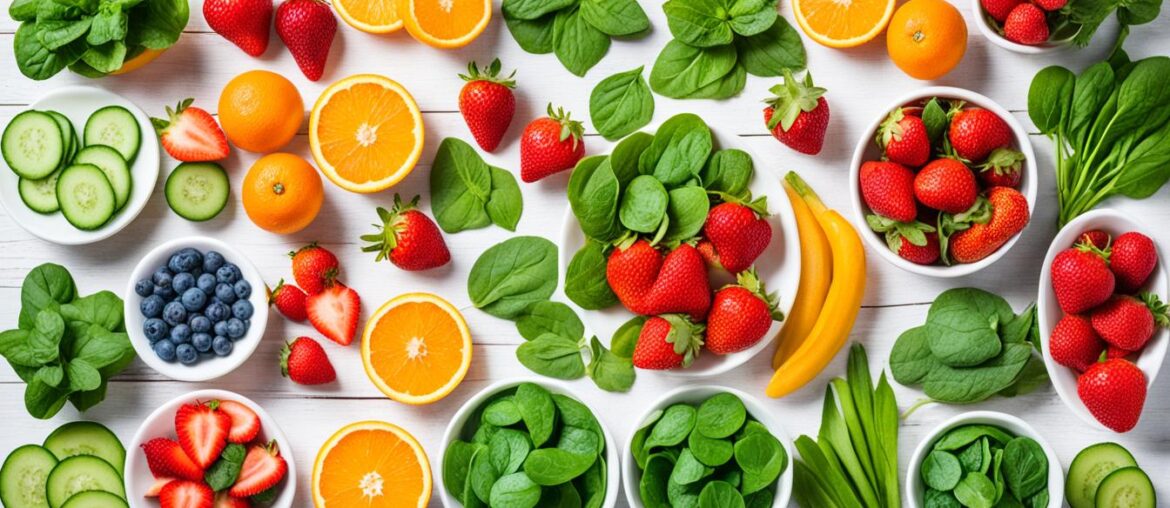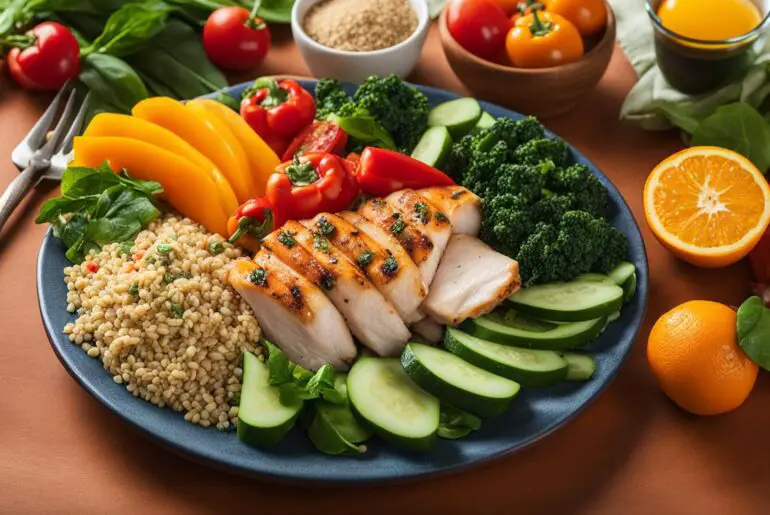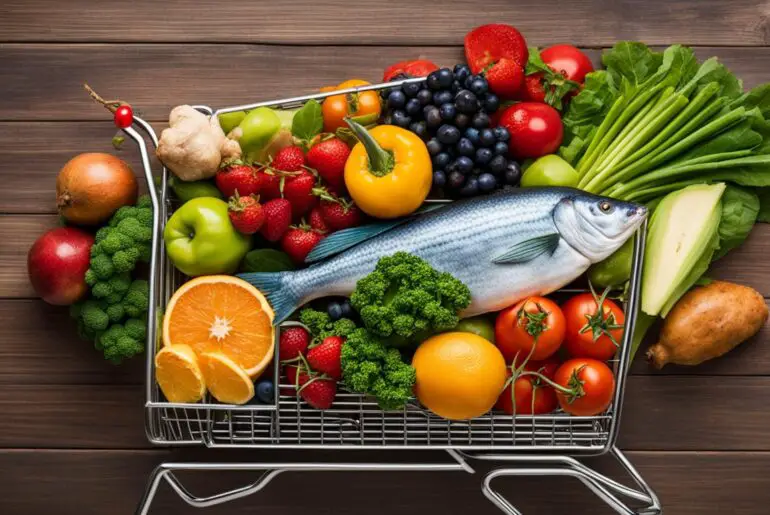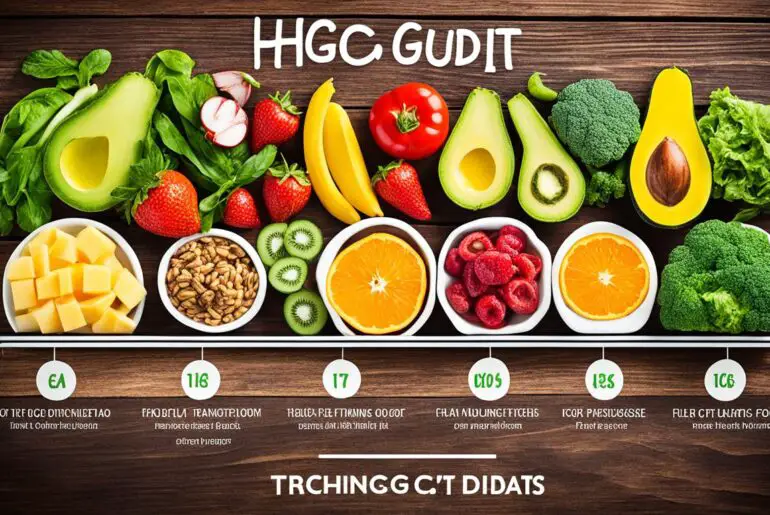Did you know that the HCG diet, a controversial weight loss plan, requires strict adherence to a list of approved food items? While the effectiveness of the HCG hormone itself is questionable, the diet’s approved foods play a crucial role in achieving the desired results. Understanding what foods are allowed can make a significant impact on your success with this diet.
Key Takeaways:
- The HCG diet is a controversial weight loss plan that combines HCG supplements or hormone injections with an extremely low-calorie diet.
- While there is no substantial evidence that the HCG hormone itself promotes weight loss, the diet does have a list of approved food items.
- Approved HCG diet foods include lean proteins, certain vegetables, limited fruits, specific seasonings, and approved beverages.
- It is vital to consult with a healthcare professional before starting the HCG diet to ensure suitability and safety.
- Strict adherence to the approved food items and calorie restrictions is essential for the success of the HCG diet.
Understanding the HCG Diet
The HCG diet is a controversial weight loss plan that combines HCG supplements or hormone injections with a low-calorie diet. It is important to understand the different phases and components of this diet to make informed decisions about its effectiveness and safety.
The Phases of the HCG Diet
The HCG diet is divided into three main phases: the loading phase, the weight loss phase, and the maintenance phase.
- The Loading Phase: During the loading phase, you consume high-fat, high-calorie foods for two days while starting HCG supplementation. This phase helps prepare your body for the calorie-restricted phase that follows.
- The Weight Loss Phase: The weight loss phase typically lasts for three to six weeks. During this phase, you adhere to a low-calorie diet, consuming either 500 or 800 calories per day, depending on your specific plan. The combination of the low-calorie diet and HCG supplementation is thought to promote weight loss.
- The Maintenance Phase: The maintenance phase occurs after completing the weight loss phase. During this phase, you gradually increase your calorie intake while discontinuing HCG supplementation. The goal is to stabilize your weight and establish healthy eating habits.
The Controversy Surrounding the HCG Diet
While some individuals report successful weight loss results with the HCG diet, it is important to note that the effectiveness and safety of this diet are highly disputed by health experts.
Many health professionals argue that the weight loss experienced on the HCG diet is primarily due to the severe calorie restriction rather than the HCG hormone itself. Additionally, the diet’s strict guidelines and limited food options may lead to nutritional deficiencies and an unsustainable eating pattern.
Before considering the HCG diet, it is crucial to consult with a healthcare professional who can provide personalized guidance and evaluate whether this controversial weight loss plan is suitable for you.
Whether you decide to pursue the HCG diet or explore alternative weight loss strategies, it is essential to prioritize your overall health and well-being. The next sections will delve into specific aspects of the HCG diet, including approved food items, meal planning, and maintaining the diet for long-term success.
HCG Diet Approved Lean Proteins
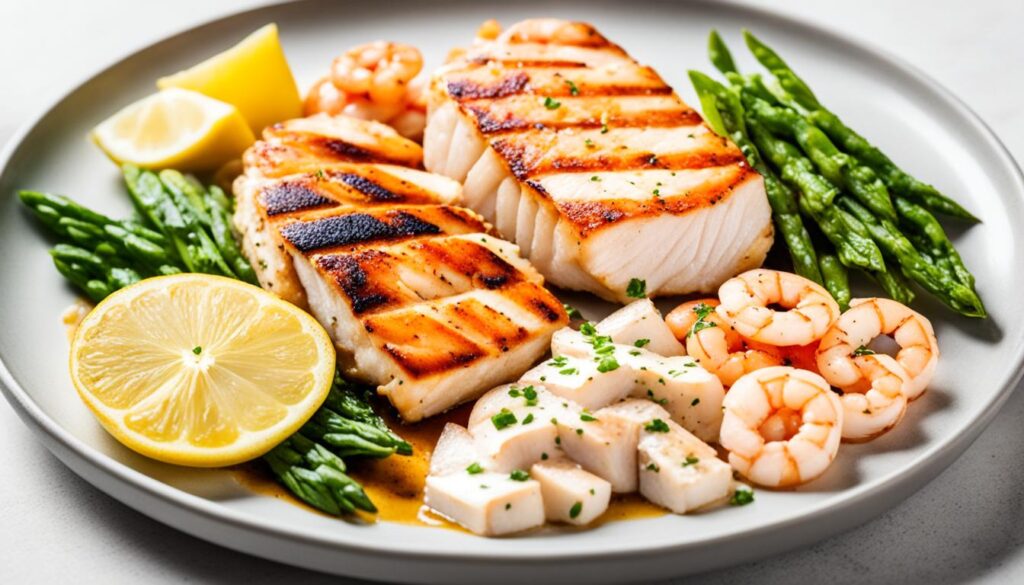
Lean proteins play a vital role in the HCG diet, providing essential nutrients and helping to maintain muscle mass during the low-calorie phase. Here are some approved lean protein choices that you can enjoy on the HCG diet:
| Protein Choices | Description |
|---|---|
| Chicken Breast | A lean and versatile protein option that can be prepared in various ways. |
| Lean Cuts of Beef | Opt for cuts such as sirloin and tenderloin, removing any visible fat before cooking. |
| Turkey | Enjoy turkey breast, a lean and flavorful alternative to other protein sources. |
| White Fish | Options like cod and tilapia are low in calories and high in protein. |
| Crab | A delicious seafood choice that can be enjoyed as a lean protein source. |
| Lobster | Savor the indulgence of lobster, low in calories and fat. |
| Scallops | Delicate and flavorful, scallops are a tasty addition to your HCG diet meals. |
| Bison | Lean and nutrient-rich, bison can be a great alternative to beef. |
Remember to select lean cuts of meat and remove any visible fat before cooking. This ensures that you obtain the maximum nutritional benefits while adhering to the HCG diet guidelines.
With these delicious protein choices, you can create satisfying and nutritious meals to support your weight loss journey on the HCG diet.
HCG Diet Approved Vegetables
When following the HCG diet, incorporating approved vegetables into your meals is essential. These vegetables not only add nutritional value but also contribute to a satisfying and varied diet. Here are some HCG diet approved vegetable options:
- Spinach
- Chard
- Beet greens
- Cabbage
- Lettuce
- Celery
- Cauliflower
- Broccoli
- Asparagus
- Tomatoes
- Onion
- Shallots
- Radishes
These HCG diet approved vegetables are low in calories and packed with essential vitamins and minerals. They can be enjoyed raw, steamed, grilled, or sautéed to suit your taste preferences. However, it’s important to prepare them without added fats or oils to maintain the low-calorie nature of the diet.
Here is an informative table highlighting the nutritional benefits of some popular HCG diet approved vegetables:
| Vegetable | Calories per Serving Size (100g) | Nutritional Benefits |
|---|---|---|
| Spinach | 23 | Rich in iron, vitamin K, and fiber |
| Asparagus | 20 | High in folate and vitamins A, C, and K |
| Broccoli | 34 | Excellent source of vitamin C and fiber |
| Cauliflower | 25 | High in vitamin C and a good source of dietary fiber |
| Tomatoes | 18 | Loaded with antioxidants and a good source of vitamin C |
Incorporating these HCG diet approved vegetables into your meals not only adds variety but also provides important nutrients to support your weight loss journey. Remember to follow the guidelines of the HCG diet and consult with a healthcare professional to ensure the proper implementation of this weight loss plan.
HCG Diet Approved Fruits
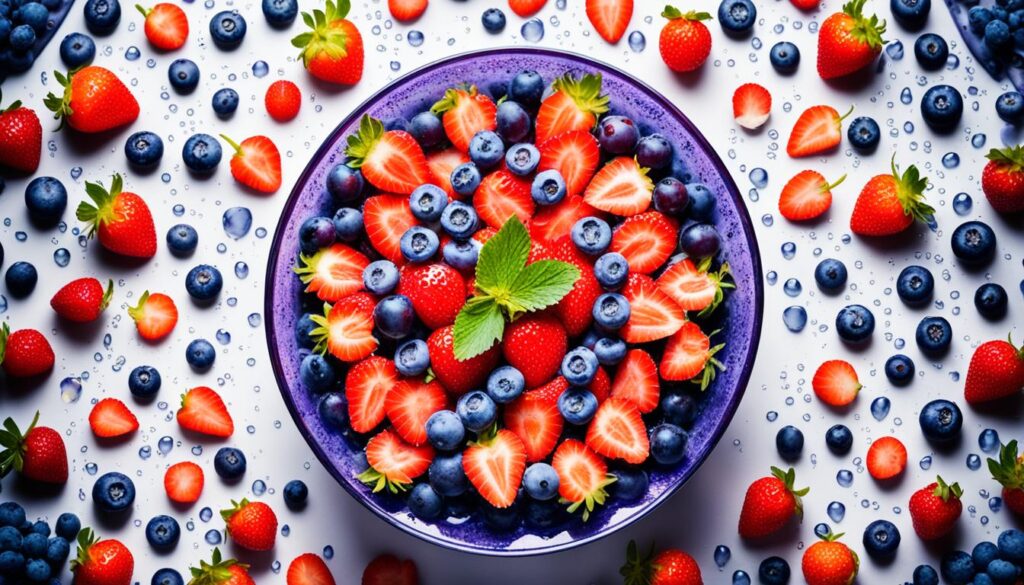
While following the HCG diet, it is important to limit fruit intake due to their natural sugars. However, there are specific fruits that are approved in moderation. These fruits offer a lower sugar content compared to other varieties, making them suitable options on the diet. They not only provide essential nutrients but also help satisfy sweet cravings without compromising progress.
Approved fruit options on the HCG diet include:
- Berries: Strawberries and blueberries are excellent choices. They are rich in antioxidants, fiber, and vitamins, while being relatively low in sugar.
- Citrus fruits: Oranges and grapefruits are refreshing and packed with vitamin C. They have a tangy flavor and are relatively lower in sugar compared to other fruits.
These HCG diet approved fruits are not only delicious but also provide a variety of health benefits. Incorporating them into your diet can help maintain a balanced and nutritious approach to weight loss.
Why choose berries?
Berries are highly recommended on the HCG diet due to their numerous health benefits. They are low in calories, high in fiber, and rich in antioxidants. Antioxidants play a crucial role in protecting the body against damage caused by harmful free radicals and may help reduce the risk of chronic diseases. Berries are also known to promote healthy digestion and support overall well-being. Enjoying a handful of strawberries or blueberries can add a burst of flavor to your meals while keeping your sugar intake in check.
“Berries are nutritional powerhouses, packed with vitamins, minerals, and antioxidants. They are an excellent choice for those on the HCG diet looking to satisfy their sweet tooth while keeping their sugar intake under control.” – Dr. Jane Wilson, Nutritionist
HCG Diet Approved Seasonings and Sweeteners
When it comes to adding flavor to your meals on the HCG diet, herbs, spices, and sweeteners are your best friends. These approved seasonings and sweeteners not only enhance the taste of your food but also help you stay on track with your weight loss goals. Let’s take a look at some of the HCG diet-approved options:
Seasonings:
- Garlic: Known for its aromatic and savory properties, garlic adds a delightful punch of flavor to your dishes.
- Lemon Juice: The tangy and refreshing taste of lemon juice can bring a zesty twist to your meals.
- Salt and Pepper: These classic seasonings are essential for enhancing the taste of your proteins and veggies.
- Rosemary and Thyme: These aromatic herbs can elevate the flavors of your dishes, lending them a delightful fragrance.
Sweeteners:
If you have a sweet tooth, don’t worry! You can still enjoy some sweetness on the HCG diet with the help of an approved sweetener:
- Stevia: A natural sweetener derived from the stevia plant, it provides a calorie-free way to add sweetness to your meals and beverages.
It’s important to note that while these seasonings and sweeteners are allowed on the HCG diet, you should avoid using oils, butter, or high-calorie dressings when preparing your meals. Keeping your calorie intake low is key to achieving optimal results.
So go ahead, get creative in the kitchen and experiment with these HCG diet-approved seasonings and sweeteners to make your meals both flavorful and enjoyable.
HCG Diet Approved Beverages
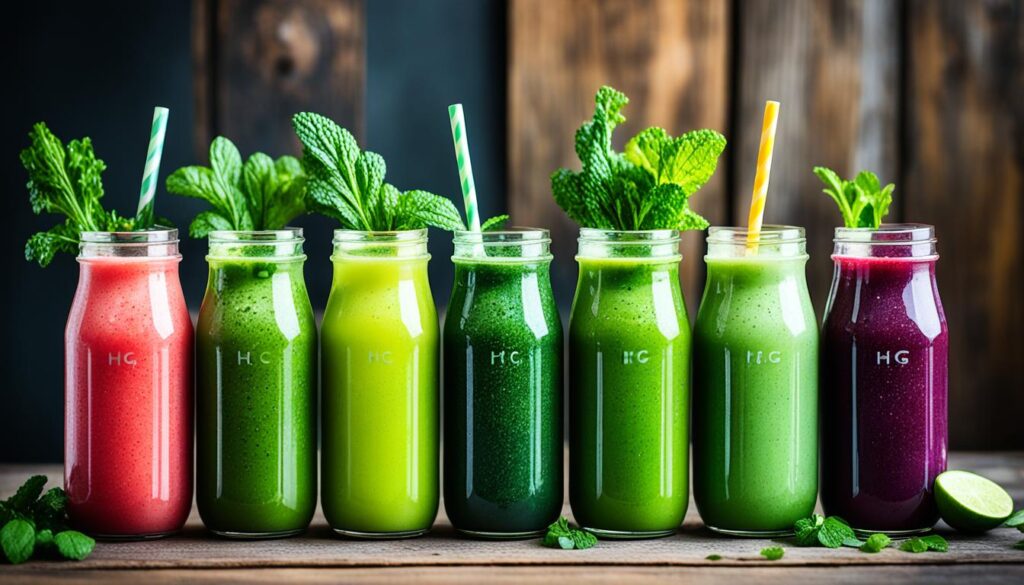
Staying hydrated is crucial on the HCG diet. When it comes to choosing beverages, there are several options that are approved for the diet. These include coffee, tea, and water.
| HCG Diet Drink Choices | Description |
|---|---|
| Coffee | Enjoy a cup of coffee on the HCG diet. You can sweeten it with stevia or saccharine, and remember to consume it in moderation. |
| Tea | Sipping on a hot cup of tea is another beverage option for the HCG diet. Like coffee, you can add sweetness with stevia or saccharine and enjoy it in moderation. |
| Water | Water is essential for hydration on any diet, including the HCG diet. Make sure to drink an adequate amount of water throughout the day. |
It is important to note that when consuming coffee or tea, you should avoid adding milk or cream. However, you are allowed one tablespoon of milk per day as per the guidelines of the HCG diet.
By choosing these approved beverages, you can stay hydrated and satisfy your cravings while following the HCG diet.
Stay Hydrated with HCG Diet Approved Beverages
Proper hydration is essential for overall health and well-being, especially when following the HCG diet. Water is the best choice for hydration, as it contains no calories or additives. It helps maintain bodily functions, aids in digestion, and can even contribute to weight loss.
Coffee and tea can also be enjoyed on the HCG diet, as long as they are consumed in moderation and without adding milk or cream. These beverages can be a great way to start your day or enjoy a relaxing moment. Remember to sweeten them with stevia or saccharine, as these are the approved sweeteners for the HCG diet.
It’s important to prioritize hydration while on the HCG diet, as it can help prevent headaches, support digestion, and keep you feeling energized throughout the day. Make sure to drink an adequate amount of water and approved beverages to stay on track with your weight loss goals.
Foods to Avoid on the HCG Diet
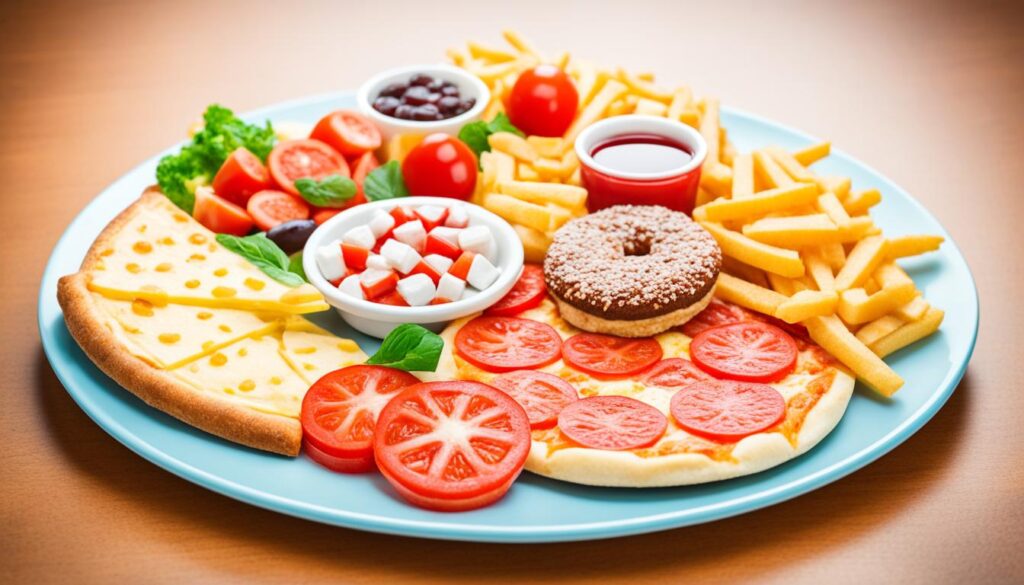
When following the HCG diet, it is important to be aware of the foods that should be avoided. These food restrictions are in place to ensure optimal weight loss and the effectiveness of the diet. Here are the foods that are prohibited on the HCG diet:
- Fats and Oils: This includes butter, margarine, vegetable oils, and any other high-fat cooking oils.
- Added Sugars: Avoid consuming sugar in any form, including white sugar, brown sugar, honey, maple syrup, and artificial sweeteners.
- Alcohol: Alcoholic beverages are not allowed on the HCG diet due to their high calorie content and potential impact on weight loss.
- Dairy Products: Dairy, such as milk, cheese, and yogurt, are restricted on the HCG diet due to their high fat and carb content.
- High-Carb Foods: Bread, pasta, rice, potatoes, and other starchy foods should be avoided as they can hinder weight loss progress on the HCG diet.
- Desserts: Cookies, cakes, ice cream, and other high-sugar desserts are not permitted on the HCG diet.
Adhering to these food restrictions is crucial for the success of the HCG diet. By avoiding these prohibited foods, you can optimize your weight loss and achieve your goals on the HCG diet.
For a comprehensive list of approved and prohibited foods on the HCG diet, refer to the table below:
| Approved Foods | Prohibited Foods |
|---|---|
| Lean proteins (chicken breast, lean cuts of beef, turkey, white fish, crab, lobster, scallops, bison) | Fats and oils (butter, margarine, vegetable oils) |
| Spinach, chard, beet greens, cabbage, lettuce, celery, cauliflower, broccoli, asparagus, tomatoes, onion, shallots, radishes | Added sugars (white sugar, brown sugar, honey, maple syrup, artificial sweeteners) |
| Berries (strawberries, blueberries), citrus fruits (oranges, grapefruits) | Alcohol |
| Garlic, lemon juice, salt, pepper, rosemary, thyme | Dairy products (milk, cheese, yogurt) |
| Coffee, tea, water | High-carb foods (bread, pasta, rice, potatoes) |
| – | Desserts (cookies, cakes, ice cream) |
Please note that this table provides a general overview and it is important to refer to the specific HCG diet guidelines for a comprehensive list of approved and prohibited foods.
Creating an HCG Diet Meal Plan
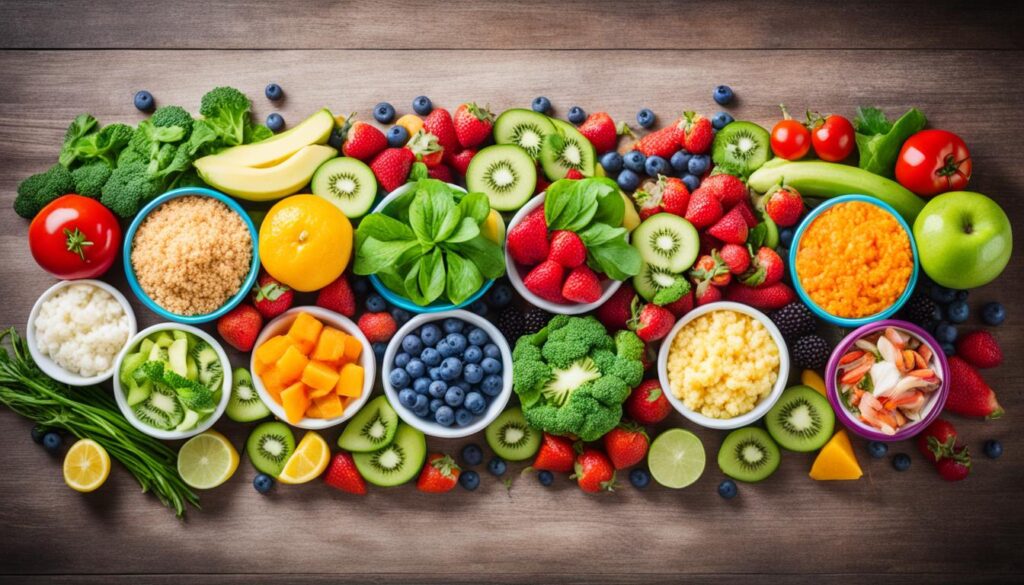
When following the HCG diet, it is crucial to create a well-rounded meal plan that includes approved lean proteins, vegetables, fruits, and seasonings. Designing a nutritious and satisfying meal plan can help support your weight loss goals while ensuring you stay within the guidelines of the diet. Here are some HCG diet meal ideas, sample menus, and recipes to get you started.
Breakfast
A nutrient-rich breakfast is essential to kickstart your day on the HCG diet. Here’s a delicious and filling meal idea:
- Scrambled egg whites with spinach
Egg whites provide lean protein, while spinach adds vitamins and minerals to your meal. Remember to avoid adding any oils or fats when cooking.
Lunch
For a satisfying midday meal, consider this HCG diet-approved option:
- Grilled chicken breast with mixed vegetables
Grilled chicken breast serves as a lean protein source, and a variety of mixed vegetables ensure you get essential nutrients. Make sure to remove any visible fat from the chicken before cooking.
Dinner
End your day with a delicious and light dinner that fits the requirements of the HCG diet:
- White fish with asparagus
White fish is an excellent choice for its low calorie and high protein content. Asparagus adds a flavorful addition to your meal while providing essential vitamins and minerals.
Remember, it is crucial to follow the calorie restrictions and portion sizes outlined in the HCG diet plan to ensure effective weight loss. Here is an example of a simple HCG diet sample menu:
| Meal | Food Items |
|---|---|
| Breakfast | Scrambled egg whites with spinach |
| Lunch | Grilled chicken breast with mixed vegetables |
| Dinner | White fish with asparagus |
By incorporating a variety of approved lean proteins, vegetables, and fruits into your meals, you can create a satisfying and nourishing HCG diet meal plan. Remember to experiment with different seasonings to add flavor without extra calories. Stay committed to the diet and consult with a healthcare professional to ensure your safety and success throughout your HCG diet journey.
Maintaining the HCG Diet
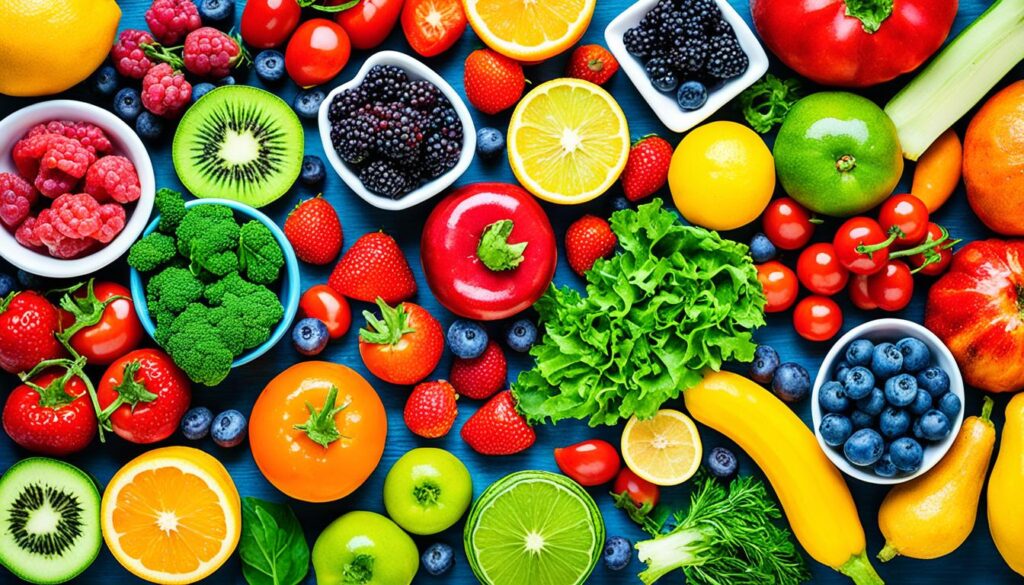
The HCG diet can be challenging to maintain due to the low-calorie restriction. As someone who has gone through the diet myself, I understand the difficulties and the importance of staying on track. Here are some tips to help you maintain the HCG diet for long-term success.
1. Strong Commitment
Maintaining the HCG diet requires a strong commitment to your weight loss goals. Remind yourself why you started this journey and stay motivated. Keep your eye on the prize and remember that your hard work will pay off.
2. Seek Medical Supervision
It is essential to seek medical supervision when following the HCG diet. A healthcare professional can provide guidance, monitor your progress, and address any concerns or challenges you may face. They can also offer personalized advice tailored to your specific needs.
3. Gradually Increase Calorie Intake
The maintenance phase of the HCG diet involves gradually increasing your calorie intake. Slowly reintroduce foods into your diet while still being mindful about portion control and calorie counting. This phase is crucial for transitioning back to a regular eating routine without gaining weight rapidly.
4. Avoid Sugar and Starchy Foods
While increasing calories, continue to avoid sugar and starchy foods. These types of foods can lead to weight gain and hinder your progress. Instead, focus on incorporating lean proteins, vegetables, and fruits into your diet to maintain a balanced and healthy eating plan.
5. Incorporate Healthy Eating Habits
To ensure long-term success with the HCG diet, it is important to incorporate healthy eating habits beyond the maintenance phase. Make wise food choices, prioritize whole foods, and aim for a well-rounded diet. This will not only help you maintain your weight loss but also promote overall health and well-being.
6. Regular Exercise
Along with healthy eating, regular exercise plays a vital role in maintaining the HCG diet. Incorporate physical activity into your routine to support weight management, boost metabolism, and improve overall fitness. Find activities that you enjoy and make them a part of your everyday life.
Maintaining the HCG diet may have its challenges, but with commitment, support, and healthy habits, it can be sustainable in the long term. Remember to consult with a healthcare professional before starting any diet or exercise program, and always prioritize your well-being and health.
Boosting Mood and Energy on the HCG Diet
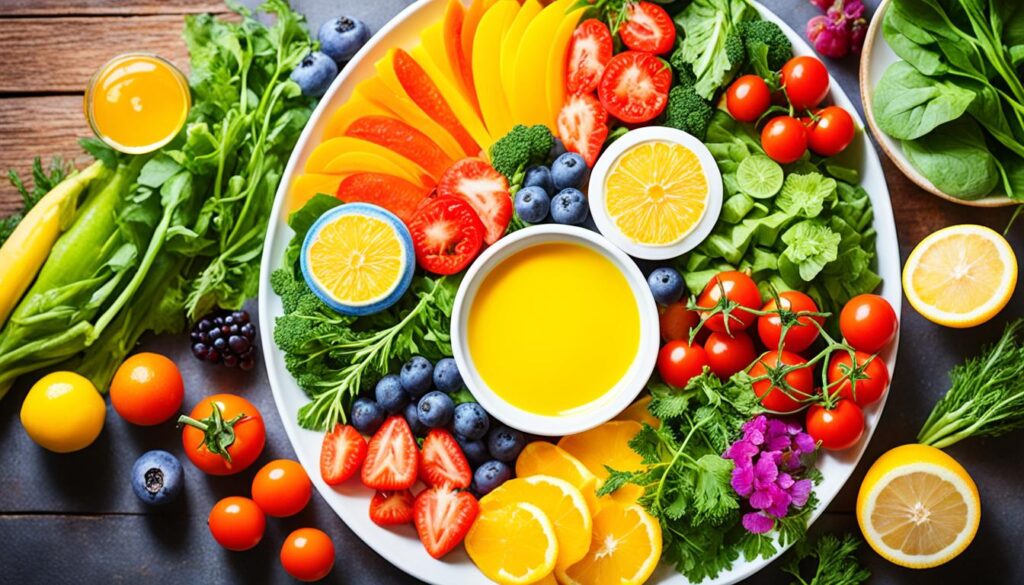
Following a very low-calorie diet like the HCG diet can sometimes lead to mood swings, fatigue, and low energy levels. It’s important to address these challenges to ensure a successful and positive experience. One way to boost mood and increase energy while on the HCG diet is through the use of lipotropic injections.
Lipotropic injections, such as Lipo C injections, can be a valuable addition to your HCG diet regimen. These injections contain a combination of essential nutrients, including lipotropic agents like methionine, inositol, and choline, as well as essential vitamins and minerals. These nutrients work together to improve overall well-being and support weight loss efforts.
The lipotropic agents in the injections play a crucial role in enhancing liver function and metabolism, which can help optimize the body’s ability to burn fat. By improving fat metabolism, these injections can support weight loss and contribute to increased energy levels. Additionally, the inclusion of essential vitamins and minerals can help combat nutritional deficiencies that may arise during the low-calorie phase of the HCG diet.
When considering the use of lipotropic injections on the HCG diet, it is essential to consult with healthcare professionals. They can provide guidance on the appropriate dosage and frequency of injections, as well as ensure that you do not have any underlying medical conditions that may interfere with their effectiveness.
Taking care of your mental and physical well-being is crucial during any weight loss journey, including the HCG diet. Incorporating lipotropic injections, like Lipo C injections, can provide the necessary support to boost mood, increase energy levels, and enhance the overall effectiveness of the HCG diet.
Benefits of Lipotropic Injections on the HCG Diet:
| Benefits | Description |
|---|---|
| Improved Mood | Lipotropic injections can help balance neurotransmitters in the brain, leading to improved mood and reduced mood swings. |
| Increased Energy | By optimizing fat metabolism, lipotropic injections can provide a sustainable source of energy, combating fatigue associated with low-calorie diets. |
| Enhanced Weight Loss | The combination of lipotropic agents and essential nutrients in the injections can support weight loss efforts by promoting fat burning and maintaining muscle mass. |
| Nutritional Support | Lipotropic injections help address potential nutrient deficiencies that may arise during the low-calorie phase of the HCG diet, ensuring overall well-being. |
Conclusion
The HCG diet combines HCG supplements or hormone injections with an extremely low-calorie diet, aiming to achieve rapid weight loss. However, it is important to note that the HCG diet is not recognized as a safe or effective weight loss method by health experts. While it may lead to short-term weight loss, the long-term sustainability and safety of this diet are questionable.
Strict adherence to the approved food items and calorie restrictions is required when following the HCG diet. The diet emphasizes lean proteins, vegetables, and limited fruits, while avoiding fats, oils, added sugars, alcohol, and high-carb foods.
Before embarking on the HCG diet, it is crucial to consult with a healthcare professional, who can provide guidance and assess whether this approach is suitable for your individual needs and health status. It is also advisable to consider other weight loss options that are safer and more sustainable in the long run.
While the HCG diet may seem appealing for its potential for rapid weight loss, it is essential to prioritize overall health and well-being. Sustainable weight loss involves making gradual and realistic lifestyle changes, such as adopting a balanced diet and incorporating regular physical activity, in consultation with healthcare professionals.
FAQ
What is the HCG diet?
The HCG diet is a controversial weight loss plan that combines HCG supplements or hormone injections with an extremely low-calorie diet.
Are there approved food items on the HCG diet?
Yes, the HCG diet has a list of approved food items that include lean proteins, certain vegetables, limited fruits, and specific seasonings and sweeteners.
What are some examples of approved lean proteins on the HCG diet?
Approved lean protein choices on the HCG diet include chicken breast, lean cuts of beef, turkey, white fish, crab, lobster, scallops, and bison.
What vegetables are approved on the HCG diet?
Approved vegetables on the HCG diet include spinach, chard, beet greens, cabbage, lettuce, celery, cauliflower, broccoli, asparagus, tomatoes, onion, shallots, and radishes.
Can I have fruits on the HCG diet?
Yes, limited fruit options are allowed on the HCG diet, including berries such as strawberries and blueberries, and citrus fruits like oranges and grapefruits.
What seasonings and sweeteners are allowed on the HCG diet?
Approved seasonings on the HCG diet include garlic, lemon juice, salt, pepper, rosemary, and thyme. Stevia, a natural sweetener, can be used in moderation to add sweetness.
What beverages can I have on the HCG diet?
Approved beverage choices on the HCG diet include coffee, tea, and water. Coffee and tea can be sweetened with stevia or saccharine in moderation, and no milk or cream should be added except for one tablespoon of milk per day.
What foods should I avoid on the HCG diet?
Foods to avoid on the HCG diet include fats and oils, added sugars, alcohol, dairy products, high-carb foods like bread and pasta, and desserts like cookies and cakes.
How can I create an HCG diet meal plan?
Creating an HCG diet meal plan involves incorporating approved lean proteins, vegetables, fruits, and seasonings into daily meals while following the calorie restrictions and portion sizes outlined in the HCG diet plan.
How can I maintain the HCG diet?
It is important to have a strong commitment to the HCG diet and seek medical supervision. The maintenance phase involves gradually increasing calorie intake while avoiding sugar and starchy foods. It is crucial to develop healthy eating habits and regular exercise to avoid rapid weight gain after completing the HCG diet.
How can I boost mood and energy on the HCG diet?
Lipotropic injections, such as Lipo C injections, can be used alongside the HCG diet to boost mood and increase energy. These injections contain nutrients that help improve overall well-being and support weight loss efforts. Consult with healthcare professionals about the use of lipotropic injections.
Is the HCG diet a safe and effective weight loss option?
The HCG diet is a controversial weight loss plan and is not recognized as safe or effective by health experts. It is crucial to consult with a healthcare professional before starting the HCG diet and to consider other weight loss options that are safer and more sustainable.

